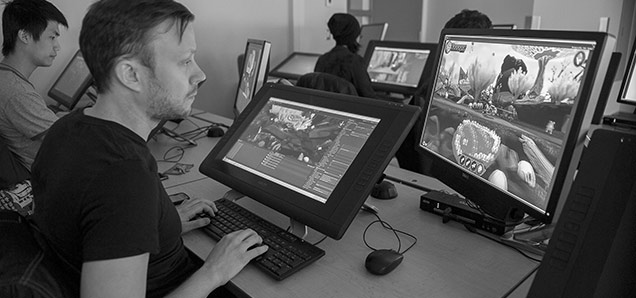Hope for a new three-year game design program
 CREDIT: JOHN SING
CREDIT: JOHN SINGShane Hillman, a student in Fanshawe's 3D Animation and Character Design program works on an assignment in class.
Employees and students alike are anxiously waiting for news on approval for a highly anticipated game design program set to launch for September 2015.
Supervisor of the Centre for Digital and Performing Arts, Michelle Giroux, said the process started over a year ago, and the School of Contemporary Media is just waiting for the OK from the Ministry.
“There is a need [for the program], and we’re addressing the need of the industry,” she said. “This will be a better fit to educate students for the jobs going forward, and the fact that it’s three years will help get them ready for the marketplace and the employers faster.”
Before talk of the program began, instructor Chris Butts has been evolving the curriculum since he started teaching at the college.
“Before it was more of a filmbased study, and it was storyboarding,” he said. “Now it’s more studying things like the Unity game engine, project management and game design.”
Butts, a graduate of Fanshawe’s 3D Animation and Character Design program, said the proposed new program will equip future students with skills transferrable within different industries.
“[The program is] going to give students not just the experiences they need and the skillset they need to work in the video game industry, it’s also going to start to give them skillsets they can use in other fields like film, medical and industrial visualization,” he said.
The video game industry is growing, even in a city like ours.
“There’s several studios already here in London,” Butts said. “They’re all doing well, [and] they’ve all had their fair share of successes and will continue to do so. But there’s also a small indie movement that’s growing quickly.”
“The more that we teach, the more that we prepare students to be able to deal with the challenges that are going to face them in an industry like this, then it’s only going to make things much better for London,” he added.
Launching this program could help the college take large steps into becoming more of an arts school.
“Some of the people who will be teaching [in] the [program will] have long history and careers from the video game industry,” Butts said.
He’s still heavily involved in the industry, and it won’t change if the program comes into fruition. The same could be said about instructors who will fall under that faculty umbrella.
“The fact that this industry is so highly competitive and so quickly evolving that even if you’re teaching constantly, you still want to be involved … so you don’t lose your pace.”
The program is sure to be a hit as for courses like Video Game Theory, the numbers are continually on the rise.
Instructor Robert Muhlbock pioneered the course almost when he first landed his teaching position.
“I was hired in 2007,” he said. “About a year later they wanted to come up with a new gen ed [course].”
The college picked it up, and it’s grown since.
“When I started I think it literally was one section, and it’s only expanded,” said Muhlbock. “Now to my knowledge, this term alone there are three sections, and it’s usually about six [or] seven a year.”
“From what I’ve been told, it’s the most popular gen elective.”
Giroux hopes for a final answer before Christmas or at the earliest, before prospective college students submit their applications.
“[We’re] pushing and pushing to get an answer so that we can hit [when] the OCAS opens,” she said. “So when a student goes in to apply [they’ll] see all the options.”













